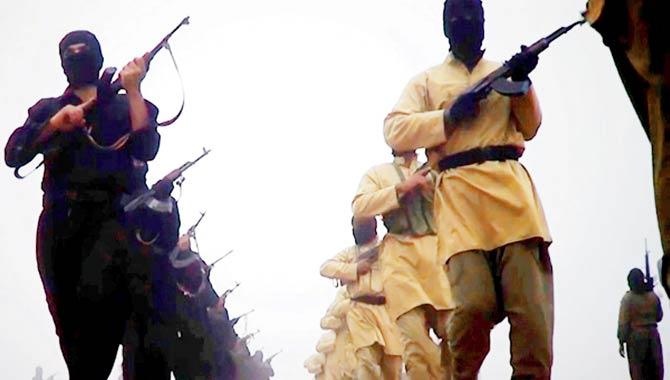The Islamic State group has trained at least 400 fighters to target Europe in deadly waves of attacks, deploying interlocking terror cells like the ones that struck Brussels and Paris

Brussels airport workers and their relatives place pay tribute to the victims of Brussels triple attacks at a makeshift memorial near the airport in Zaventem on March 23, 2016, a day after triple bomb attacks at the Brussels airport and at a subway train
Paris: The Islamic State group has trained at least 400 fighters to target Europe in deadly waves of attacks, deploying interlocking terror cells like the ones that struck Brussels and Paris with orders to choose the time, place and method for maximum carnage.
ADVERTISEMENT

An image grab taken from a video released by ISIS
The network of agile and semiautonomous cells shows the reach of the extremist group in Europe even as it loses ground in Syria and Iraq. The officials, including European and Iraqi intelligence officials and a French lawmaker who follows the jihadi networks, described camps in Syria, Iraq and possibly the former Soviet bloc where attackers are trained to attack the West.
Before being killed in a police raid, the ringleader of the Nov 13 Paris attacks claimed to have entered Europe in a multinational group of 90 fighters, who scattered "more or less everywhere." But the biggest break yet in the Paris attacks investigation the arrest on Friday of fugitive Salah Abdes lamâ did not thwart the multipronged attack just four days later on the Belgian capital-s airport and metro that left 31 people dead and an estimated 270 wounded. Three suicide bombers also died.
Just as in Paris, Belgian authorities were searching for at least one fugitive in Tuesday-s attacks this time for a man seen on security footage in the airport with the two suicide attackers. The fear is that the man, whose identity Belgian officials say is not known, will find Abdeslam-s path instructive.
After fleeing Paris immediately after the November attacks, Abdeslam forged a new network back in his childhood neighborhood of Molenbeek, long known as a haven for jihadis, and renewed plotting, according to Belgian Foreign Minister Didier Reynders "Not only did he drop out of sight, but he did so to organize another attack, with accomplices everywhere.
With suicide belts. Two attacks organized just like in Paris. And his arrest, since they knew he was going to talk, it was a response: So what if he was arrested? -We-ll show you that it doesn-t change a thing,-" said French Senator Nathalie Goulet, co-head of a commission tracking jihadi networks.
 Subscribe today by clicking the link and stay updated with the latest news!" Click here!
Subscribe today by clicking the link and stay updated with the latest news!" Click here!







